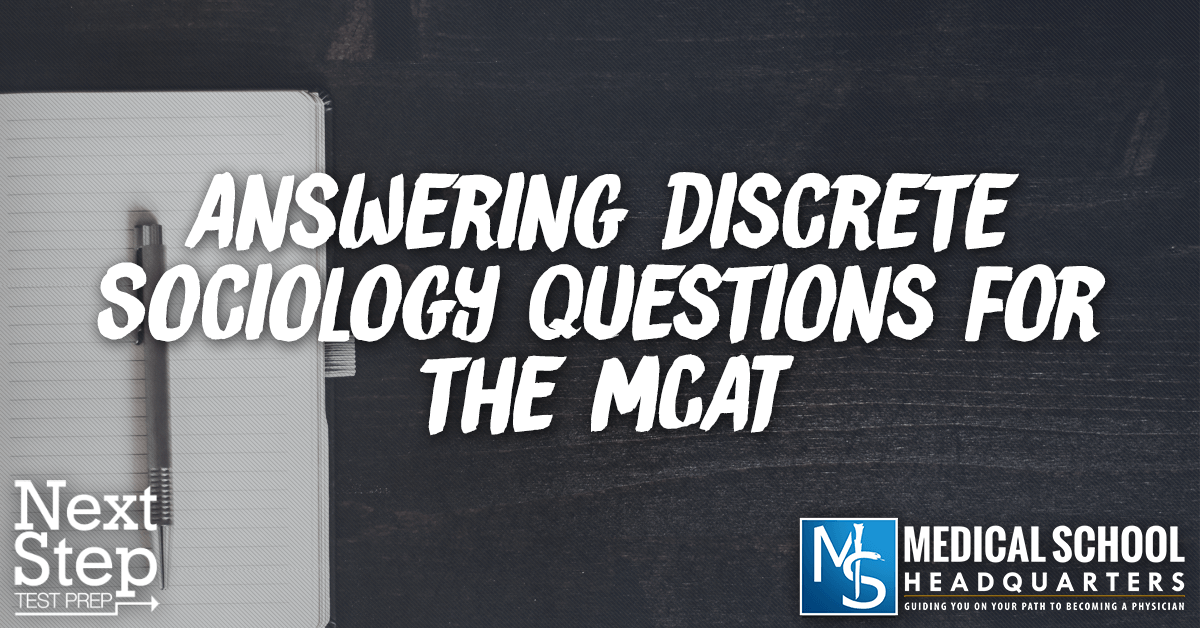Have you ever found yourself pondering the intricacies of human behavior, the impact of societal structures, or the underlying forces that shape our beliefs and actions? If so, you’re not alone. These are the very themes that underpin the sociology section of the MCAT, a challenging yet crucial component of your medical school application. As you prepare for this demanding exam, mastering the art of tackling sociology practice questions becomes essential.

Image: medicalschoolhq.net
This guide aims to demystify the MCAT’s sociology section, equipping you with the knowledge and strategies to confidently navigate its intricacies. By understanding the core concepts, common question formats, and effective study techniques, you’ll be well-prepared to conquer these questions and stand out amongst your peers.
Understanding the MCAT’s Sociology Focus
The MCAT sociology section delves into the foundational principles that shape human behavior and interactions within society. This means venturing beyond simple observations and exploring the deeper, often nuanced, forces at play. At its core, the exam assesses your grasp of:
1. The Sociological Imagination
This crucial concept, coined by sociologist C. Wright Mills, urges us to see the connections between our personal experiences and the broader social and historical contexts that shape them. Picture it as a lens through which you analyze individual actions not in isolation but within the framework of social forces like class, gender, race, and culture. Think of a seemingly individual decision, like choosing a career path. The sociological imagination prompts you to consider the influence of factors like family background, socioeconomic status, and educational opportunities on that decision. MCAT sociology questions often test your ability to apply this framework to understand complex social phenomena.
2. Social Structures and Institutions
Society is not a random collection of individuals; it’s built upon interconnected structures and institutions that shape our lives. The MCAT delves into these key building blocks, examining:
- Social Groups: How people interact within different groups, from families and friends to organizations and communities.
- Social Stratification: Unequal distribution of resources, power, and status within a society, often based on factors like socioeconomic class, race, gender, and education.
- Social Institutions: Formal structures like government, education systems, healthcare, and the economy, which play crucial roles in shaping society and individuals within it.
MCAT questions can prompt you to analyze the interplay of these elements, such as understanding how government policies impact different social groups or how educational institutions perpetuate societal inequalities.

Image: plexuss.com
3. Social Processes and Change
Societies are not static; they are constantly evolving through various processes and changes. The MCAT explores this dynamic aspect, focusing on:
- Socialization: The lifelong process by which individuals learn the norms, values, and behaviors of their society. Questions might test your understanding of how individuals are shaped by family, peers, media, and other social influences.
- Culture: The shared beliefs, values, customs, and traditions that define a particular community or society. MCAT questions could examine the role of culture in shaping behavior, social interactions, and even health outcomes.
- Social Movements: Collective efforts to challenge existing social structures and bring about change. Questions might assess your ability to analyze the motivations, strategies, and impact of social movements.
Mastering MCAT Sociology Practice Questions: Effective Strategies
Equipped with a foundational understanding of these sociological concepts, let’s explore strategies to conquer MCAT sociology practice questions:
1. Practice, Practice, Practice
The key to success lies in consistent practice. Begin with the official MCAT practice questions available through the AAMC, as they provide the best representation of the actual exam’s difficulty and format. Work through as many practice questions as possible, focusing on understanding the underlying concepts and reasoning behind the correct answers.
2. Time Management is Key
The MCAT is a highly timed exam, so learning to manage time effectively is crucial. During practice, set a timer and allocate a specific amount of time to each question. Avoid getting bogged down in any single question; if you’re unsure, mark it and move on to finish the rest of the section. You can return to the marked questions later if time permits.
3. Active Reading for Critical Analysis
Don’t simply read the practice questions passively; actively engage with the text. Identify key concepts, analyze the relationships between different elements, and anticipate potential implications. This approach will empower you to interpret the questions accurately and formulate informed responses.
4. Embrace the Art of Elimination
Multiple-choice questions on the MCAT often present a few plausible answers. Eliminate incorrect options by carefully analyzing the question, considering the concepts discussed, and applying your understanding of sociology. This process helps you narrow down your choices and increase your chances of selecting the correct answer.
5. Connecting the Dots: Real-World Examples
Beyond theoretical knowledge, the MCAT evaluates your ability to apply sociological concepts to real-world scenarios. As you practice, think about how these concepts manifest in everyday life. For instance, consider how social media influences public opinion, the role of economic inequality in health disparities, or the impact of cultural norms on gender roles. These connections will deepen your understanding and aid in analyzing practice questions.
Example MCAT Sociology Practice Questions and Explanation
Let’s illustrate these concepts with an example MCAT-style question and walk through a breakdown.
Question
A study found that individuals from lower socioeconomic backgrounds are more likely to experience chronic health conditions. Which of the following sociological concepts BEST explains this correlation?
- (A) Cultural Relativism
- (B) Social Stratification
- (C) Symbolic Interactionism
- (D) Social Mobility
Explanation
The correct answer is (B) Social Stratification. Here’s why:
- Social Stratification: This concept directly addresses the unequal distribution of resources, power, and status within a society. Lower socioeconomic backgrounds often correspond to limited access to healthcare, healthy food options, safe living conditions, and other factors that directly impact health outcomes.
- Cultural Relativism: This concept focuses on understanding cultures within their own contexts, not on comparing or judging them. It doesn’t directly explain disparities in health based on socioeconomic status.
- Symbolic Interactionism: This theory explores how individuals create meaning through social interactions and symbols. While it’s relevant to understanding how social norms influence health behaviors, it doesn’t capture the systemic inequalities embedded in social stratification.
- Social Mobility: This refers to the movement of individuals between social groups, but it doesn’t explain the initial correlation between socioeconomic status and health disparities.
Mcat Sociology Practice Questions
Conclusion
Navigating the MCAT’s sociology section demands a comprehensive understanding of core concepts and a strategic approach to tackling practice questions. By actively engaging with the material, practicing regularly, and applying sociological principles to real-world situations, you’ll equip yourself to decode the social world on test day and achieve your medical school aspirations.





